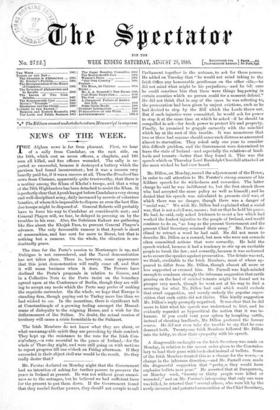Mr. Forster declared on Monday night that the Government had
no intention of asking for further powers to preserve the peace in Ireland at present. He was not without great uneasi- ness as to the outrages, but he believed we had sufficient force for the present to put them down. If the Government found that they needed farther powers, they should not scruple to call
Parliament together in the autumn, to ask for those powers. He added on Tuesday that "he would not mind taking to the Irish Office any honourable gentleman on the other side,—he did not mind what might be his prejudices,—and he felt sure he could convince him that there were things happening in certain counties which no person could for a moment defend." He did not think that in any of the cases he was referring to,. the provocation had been given by unjust evictions, such as he had desired to stop by the Bill which the Lords threw out. But if such injustice were committed, he would ask for power to stop it at the same time at which he asked—if he should be. compelled to ask—for fresh power to protect life and property. Finally, he promised to grapple earnestly with the mischief which lay at the root of this trouble. It was monstrous that two or three bad seasons should cause such distress as amounted almost to starvation. They asked only one year to consider • this difficult problem, and the Government were determined to leave the state of Ireland—and especially the relations of land- lords and tenants—better than they found it. This was the speech which on Thursday Lord Randolph Churchill attacked as the most wicked Ile had ever heard.






























